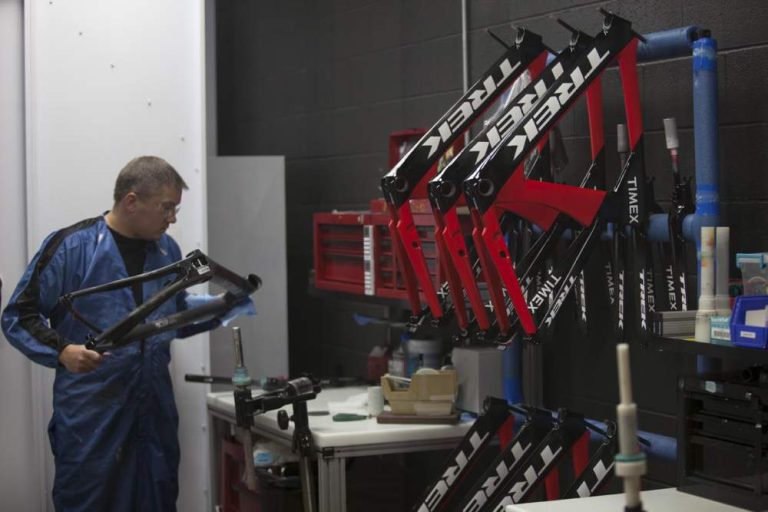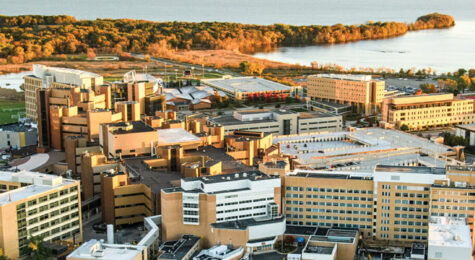Madison Region Advanced Manufacturing Rolls Ahead
An emphasis on innovation and technical education has created an advanced manufacturing sector that serves a wide variety manufacturing disciplines.

In the parking lots of Trek Bicycles in Jefferson County, it’s as common to see two-wheel commuters making their way to work as it is four-wheel commuters. It’s a way of life and a way of work at Trek, one of the major players in the high-end global bicycle industry and one of the many innovative companies in the Madison Region’s vibrant advanced manufacturing sector.
Drawing on technological capabilities and a highly skilled workforce, the region has crafted a diverse segment that includes the presence of a wealth of globally known manufacturers, including John Deere, Cardinal Glass, Cummins Emissions, Spacesaver and Kraft Foods. Technological innovation has created a number of specialized manufacturing clusters in the region, ranging from medical devices to automotive components.
Cycles of Success
One of those clusters revolves around bicycle manufacturing and includes Trek, founded in 1976. Trek has built a reputation for innovation, including pioneering the use of carbon fiber in bike frames, a recycling program for scrap carbon fiber, a crushed-glass paint coating to make the entire frame more visible and adapting NASCAR technology to redefine mountain bike suspension design. And it was a pioneer in sustainable manufacturing processes, the first manufacturer in Wisconsin to switch entirely to renewable electric power, and in the process, cut the 10.5 million pounds of coal it burned each year to zero.
In Madison, Saris Cycling Group began when Chris Fortune bought a struggling manufacturing company with 23 employees in the late 1980s. Since then it has grown into an international bicycling accessory manufacturer with more than 180 employees. Mike Root, the company’s manufacturing manager, says that more than 35 percent of Saris Cycling’s customers are outside the U.S., spread among more than 65 countries. Seventy percent of the company’s suppliers are located within 300 miles of Madison, including steel sources, injection molding, painters, decal printers, tool manufacturers and packaging materials. The nimble supply chain allows Saris to offer “Run One” manufacturing capability, building a product only when it’s ordered. Root says Saris has experienced steady growth in the past years, expanding staff by about 8 to 10 percent a year, and planning for a third expansion in 2015.
In 1996, Planet Bike started in Madison as a social experiment as well as a company. The company donates 25 percent of profits for bicycle advocacy to encourage use of bikes as transportation, says General Manager David McMurray.
“If we get more bike paths so people can ride their bikes, our market grows,” McMurray says. “It’s in our own self interest, but it’s good for our communities, too.”
Building a Strong Workforce
The region’s colleges and universities are key components in meeting the technological and workforce needs of manufacturers. Root cited UW-Madison, recognized as one of the 20 best engineering schools in the nation, as a strong resource with its Center for Quick Response Manufacturing. The region’s technical colleges – including Madison College, Blackhawk Technical College, Moraine Park Technical College and Southwest Wisconsin Technical College – provide degree programs and training that support advanced manufacturing. For example, welding and metal fabrication workers are in demand in the region, and Moraine Park Technical College in Dodge County has programs in place to keep the pipeline filled.
“Companies nowadays want people with problem-solving skills who can adapt to different processes and automation, and who can work on different metals like carbon, stainless steel and aluminum,” says Marcia Arndt, Moraine Park dean of manufacturing. “The career ladder is very strong in 2015 for talented welders and metal fabricators.”
To get the word out about opportunities in advanced manufacturing, several companies in the region joined forces in 2014 and began a campaign to raise awareness among high school students about the career path and high-paying jobs that the sector offers. Other coordinated efforts in the region support advanced manufacturing. Among them is the Manufacturing Peer Network, comprised of representatives of 15 to 20 manufacturers who meet in precompetitive environments to connect with technical colleges, collaborate on customized training programs, improve human resource efficiencies and develop business opportunities.
Manufacturing councils, such as those in Dodge, Sauk,Columbia and Marquette counties, regularly bring together industry, education, and government partners to identify workforce solutions that meet the needs of advanced manufacturers. Also aiding manufacturing are Wisconsin’s tax reform efforts, which included the Manufacturing & Agriculture tax credit. Available to individuals and entities, the credit can be applied for income derived from manufacturing or agricultural production in Wisconsin and offsets a significant share of Wisconsin income taxes.
Leading Innovation
In Columbus, a community that straddles Dodge and Columbia counties, Greg Robbins and his wife, Jan, opened Robbins Manufacturing in 1989. Since then, the company has added advanced manufacturing capabilities, such as its first robotic welding system in 1995, to produce fabricated metal products for a variety of customers. The company has added sophisticated equipment to fulfill contracts for many industry sectors, including mass transit seating, agricultural machinery, construction equipment and bicycle accessories. Robbins says the company does much of its own training to ensure employees maintain quality on the high-tech machines.
In Mineral Point, Cummins Inc. is expanding its campus with a new facility dedicated to pollution control equipment for off-highway diesel engines. The facility includes manufacturing and prototyping areas to support expanded production.
“While the plant is equipped for large-size after-treatment solutions and quality production, our business has also placed an equally strong focus on employee and building safety,” says Srikanth Padmanabhan, vice president and general manager of Cummins Emission Solutions. Check out the top industries in the Madison Region.



